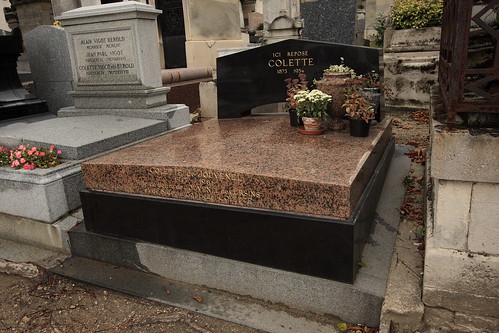The shock of growing up
Claudine in Paris
by Colette
translated from French by Antonia White
After thoroughly enjoying the first book in the Claudine series, I was glad to already have the second book waiting in my TBR. It was another wonderful, rollicking read and I’m now going to have to search out the other two.
These were the first novels written by Sidonie Gabrielle Colette, who was an absolutely fascinating literary figure. I visited her grave in Paris a few years ago and was moved in a way I hadn’t expected to be (especially considering that previous to this series her novels have failed to move me).
In this volume, Claudine and her father have moved to Paris, so that he can further his studies of slugs. She discovers to her surprise that she suffers greatly from homesickness for her beloved countryside village. She also discovers, on exposure to a new male friend who is gay and an old female friend who has become a rich man’s mistress, that she is far more easily shocked than she would have expected of herself:
“Disgust, yes definitely! There I was, making myself completely sophisticated and disillusioned and shouting from the rooftops ‘Ha, ha! You can’t teach me anything. Ha, ha! I read everything! And I understand everything even though I am only seventeen!’ Precisely. And when it comes to a gentleman pinching my behind in the street or a little friend living what I’m in the habit of reading about, I’m knocked sideways…In your heart of hearts, Claudine, you’re nothing but a common everyday decent girl.”
Well, Claudine may have discovered that the big wide world isn’t as easily bluffed as her old schoolmates were, but she is still far from common or everyday. Claudine is hypersensitive enough to catch a fever when she gets anxious but she is also tomboyish enough to do exercises every morning and speak her mind almost thoughtlessly. She is still vain enough to admire herself in every window or mirror and look coquettishly at every man she sees, but is self-aware enough to know that she is silly and vain and inexperienced to boot. She catches herself feeling jealous of an old friend who is marrying a sensible, dull sort of man and presses her friend the kept woman for information about sex while all the while feeling scared and sickened by the whole business.
Most of all, Claudine is still a witty, entertaining narrator who lets you into her world with disarming honesty, beside the occasionally withheld nugget of interest. The main switch in this book is that Claudine appears to have left behind the lesbian intrigues of school, only revisiting them for the entertainment of her cousin Marcel, who is left hot under the collar by her accounts and begs for more detail. Claudine’s romantic interest now seems to be firmly aimed toward men and marriage.
For all its shocking content and its youthful, not as sophisticated as she’d like to be narrator, this book is extremely well written with a wonderful, colourful cast of characters and a clever humour that must have been a challenge to translate this deftly.
Claudine à Paris first published in 1901 by Paul Ollendorff, attributed to Willy (Colette’s first husband)
This translation first published 1958 by Secker and Warburg
